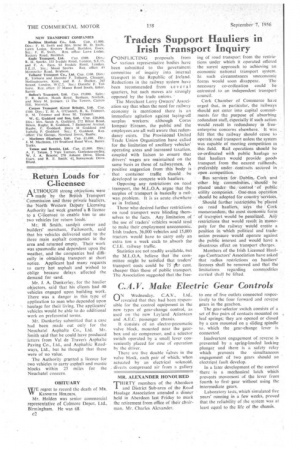Traders Support Hauliers in Irish Transport Inquiry
Page 38

If you've noticed an error in this article please click here to report it so we can fix it.
rONFLICTING. proposals from various representative bodies have been submitted to the governinent committee of inquiry into internal transport in the Republic of Ireland. Reductions in the railway system have been recommended from se ve r a I quarters, but such moves are strongly opposed by the trade unions. '
The Merchant Lorry Owners' Association say that when the need for railway economy is mentioned there is an immediate agitation against laying-off surplus workers; although Cores lompair Eireann, the public and the employees are all well aware that redundancy exists. The Provisional United Trade Union Organization have called for the limitation of ancillary vehicles' operating areas and increased taxation, coupled with liaison to ensure that drivers' wages are maintained on the same basis as those of railwaymen. A positive suggestion from this bodyis 'that container traffic should he developed to compete with hauliers.
Opposingany restrictions on road transport, the M,L.O.A. argue that the surplus of-transport is basically a railway. problem. It is as acute elsewhere as in Ireland,' Those who desired. furtherrestrictions on road transport were blinding themselves to the facts. Any, limitation of the use of traders' vehicles would tend to make their employment uneconomic. Irish traders, 36,000 vehicles and 15,000 tractors would have to carry only an extra ton a week each to, absorb the C.I.E. railway traffic,
Statistics are not readily available, but the M.L.O.A. believe that the committee might be satisfied that traders' transport costs could be 75 otr cent. cheaper than those of public transport. The Association suggested that the free
ing of road transport from the restrielions under which it operated offered the surest approach to achieving an economic national transport system. ln such circumstances uneconomic forms would soon disappear. The necessary co-ordination could be entrusted to an independent transport council.
Cork Chamber of Commerce have urged that, in particular, the railways should not enter into capital commitments for the purpose of absorbing redundant staff, especially if such action would result in redundancy in freeenterprise concerns elsewhere. It was felt that the railway should cease to operate road transport unless the system was capable of meeting competition in this field. Rail operations should he co-ordinated with public haulage so that hauliers would provide goods transport from the nearest railheads, preferably, under contracts secured in open -competition: _ Bus services fcir. Dublin,Cork and other big comuninities, 7 Should be
• placed • under the control of public utility companies; One-Man 'operation should be adopted for country "seri/ices.
• Should further restrictiOns be-placed on road • hauliers, adys the : Cork memorandum, the most 'economic form of transport would be penalized. Any restrictions that would result in Monopoly for the railway would create a position in 'which political and tradeunion pressure would operate against the public interest and would have a disastrous effect on transport charges.
Members Of the Irish Licensed Haulage Contractors' Association have asked that radius restrictions on hauliers' licences shall be removed and that the limitations regarding commodities carried shall be lifted.








































































































